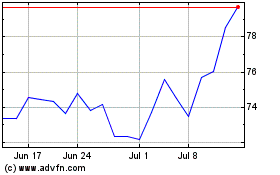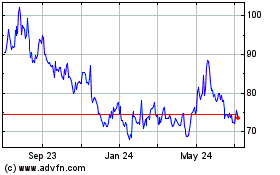By Dawn Lim, Jing Yang and Gordon Lubold
U.S. officials are considering prohibiting Americans from
investing in Alibaba Group Holding Ltd. and Tencent Holdings Ltd.,
said people familiar with the matter.
In recent weeks, State Department and Department of Defense
officials have held conversations on expanding a blacklist of
companies that are prohibited to U.S. investments because of
claimed ties to China's military and security services. The U.S.
government announced its original blacklist in November with 31
companies.
The departments have debated with the Treasury Department over
whether adding these firms could have wide capital-markets
ramifications, the people said. The plan is still under
deliberation and may not go through as agencies debate its impact
on markets, the people added.
Tencent and Alibaba are China's two most-valuable publicly
listed companies with a combined market capitalization of over $1.3
trillion, and their shares are held by scores of U.S. mutual funds
and other investors. If enacted, the move would be a major
escalation by the exiting Trump administration on its efforts to
unwind U.S. investors' holdings in major Chinese companies.
The Trump administration has stepped up efforts to sanction
Chinese companies in its final days. On Wednesday, the New York
Stock Exchange said it will move ahead to delist China's three
biggest telecommunication carriers, backtracking an earlier
decision to scrap the plan after receiving "new specific guidance"
from the Treasury Department.
On Tuesday, President Trump signed an order prohibiting U.S.
individuals and companies from transacting with eight Chinese
software apps including Alibaba affiliate Ant Group Co.'s Alipay
and Tencent's WeChat Pay. The order takes effect in 45 days, after
the inauguration of President-elect Joe Biden.
Alibaba and Tencent are tracked by major indexes including those
created by MSCI Inc. and FTSE Russell. Alibaba, listed in both New
York and Hong Kong, and Hong Kong-listed Tencent are heavyweights
in widely followed global stock indexes. Like most foreign
companies, the stocks aren't included in the Nasdaq Composite,
S&P 500 or Dow Jones Industrial Average.
In the last few weeks of the Trump presidency, U.S. government
officials have clashed over the scope of the list of companies off
limits to U.S. investors. Pentagon and State officials have been
pushing for a list with broad reach that includes high-profile
companies and subsidiaries of already-named companies in China. The
agencies have urged a tougher line to curb China's military and
security services' access to data troves, advanced technologies and
expertise. Treasury, fearing forced selling could rock financial
markets, wants a more narrow list.
The Pentagon, the lead agency managing the list, had no
immediate comment. The State Department and Treasury Department had
no immediate comment.
A spokeswoman at Alibaba didn't respond to requests for comment.
A spokesman at Tencent declined to comment.
China's Ministry of Commerce didn't respond to a request sent
outside business hours, and the Chinese embassy in the U.S.
referred to a December comment by the Ministry of Foreign Affairs
that said "China firmly opposes the wanton suppression of Chinese
companies by the United States," and "the Chinese government will
continue to safeguard Chinese companies' legitimate and lawful
rights and interests."
While Alibaba and Tencent aren't controlled by the Chinese
government, the State Department and Pentagon have long said they
feared that the companies could be coerced into sharing sensitive
data on U.S. citizens and businesses with the Chinese government
and serve as a conduit for Beijing to extend its influence.
Scores of Chinese tech companies have raised tens of billions of
dollars from U.S. and international investors in the past few
years, allowing foreign investors to capitalize on China's rapidly
growing economy.
Alibaba and Tencent have been among top constituents in the MSCI
Emerging Markets Index, accounting for a combined 11% weighting as
of Dec. 31. Similarly, the two together have claimed a 12%
weighting in the FTSE Emerging Index as of Dec. 31.
Following the November list, Pentagon expanded its list of
banned companies in December to include companies such as China's
top chip maker Semiconductor Manufacturing International Corp. and
oil major China National Offshore Oil Corp.
The State Department in August said the U.S. needs to address
the threats of cloud-based systems run by Alibaba, Tencent and
Baidu Inc. U.S. officials have become increasingly concerned in
recent weeks as Alibaba and Ant come under intense scrutiny at
home, further putting them at the mercy of Beijing, according to
one of the people familiar with the matter.
The Chinese government has tightened the screws on its tech
champions recently, unveiling a sweeping antitrust regulation aimed
at the country's biggest internet platforms, launching an
investigation into Alibaba and scuttling Ant's blockbuster initial
public offering.
In the latest episode, Chinese regulators are trying to get Ant
to share the troves of consumer-credit data it has amassed with the
central bank's credit-reporting system, The Wall Street Journal
reported.
Tencent operates the hugely popular WeChat app, which has become
one of the most powerful tools in Beijing's arsenal of tools for
monitoring the public. Tencent also owns stakes in several U.S.
videogame companies.
Major U.S. asset managers including T. Rowe Price Group Inc.,
BlackRock Inc. and Vanguard Group are among the top public
shareholders of Alibaba and Tencent through funds, according to
FactSet data.
Asset managers are lobbying to prevent a situation in which
companies such as Alibaba could become blacklisted, said a person
familiar with large financial firms' conversations with U.S.
regulators.
Last week, the Treasury Department published guidelines that
include subsidiaries in the ban if a company named on the list
holds ownership of 50% or more in them. Derivatives, bonds and
depositary receipts, as well as exchange-traded funds, index funds
and mutual funds holding securities issued by these entities in any
jurisdiction will also be restricted to U.S. investors.
Write to Dawn Lim at dawn.lim@wsj.com, Jing Yang at
Jing.Yang@wsj.com and Gordon Lubold at Gordon.Lubold@wsj.com
(END) Dow Jones Newswires
January 06, 2021 15:02 ET (20:02 GMT)
Copyright (c) 2021 Dow Jones & Company, Inc.
Alibaba (NYSE:BABA)
Historical Stock Chart
From Mar 2024 to Apr 2024

Alibaba (NYSE:BABA)
Historical Stock Chart
From Apr 2023 to Apr 2024
